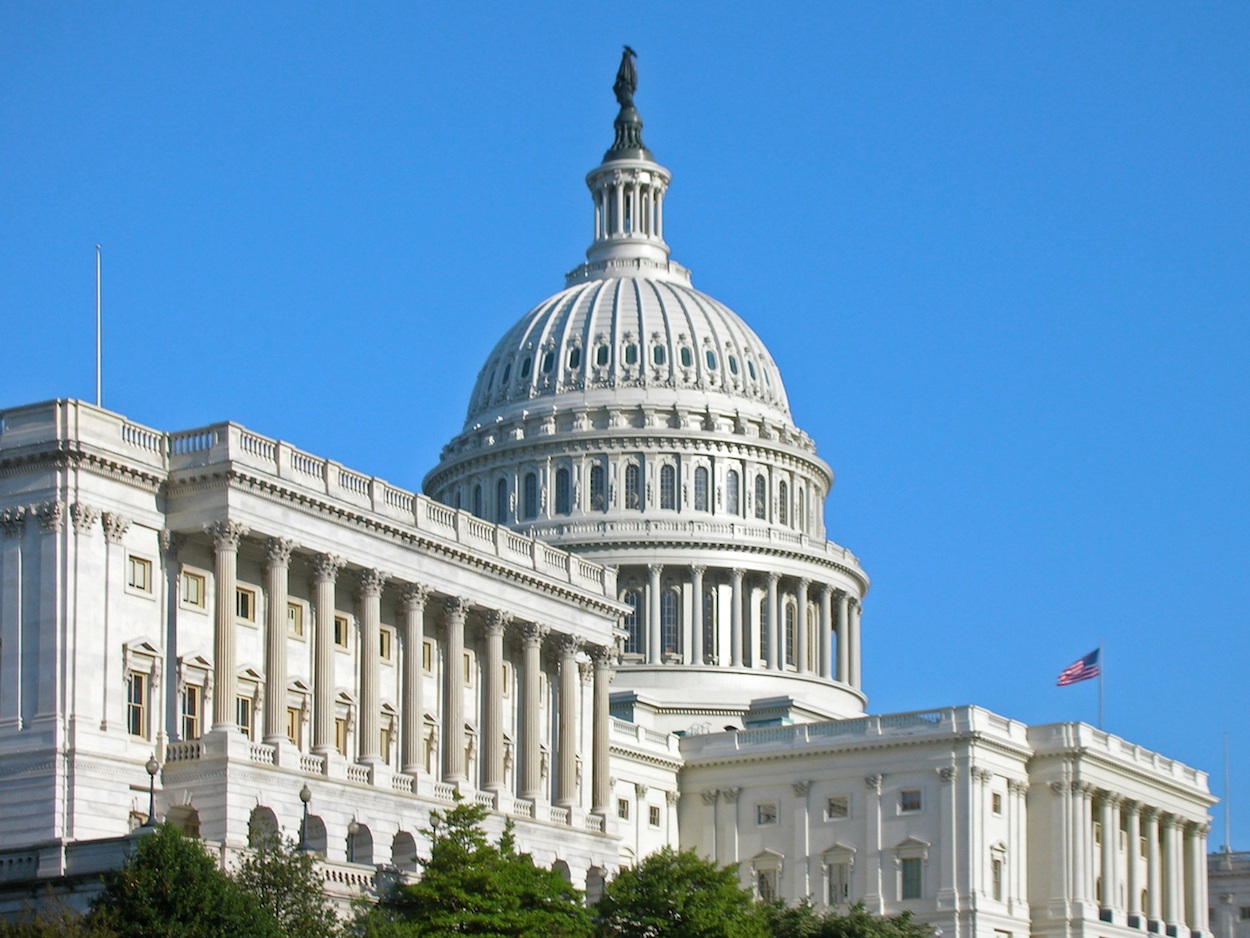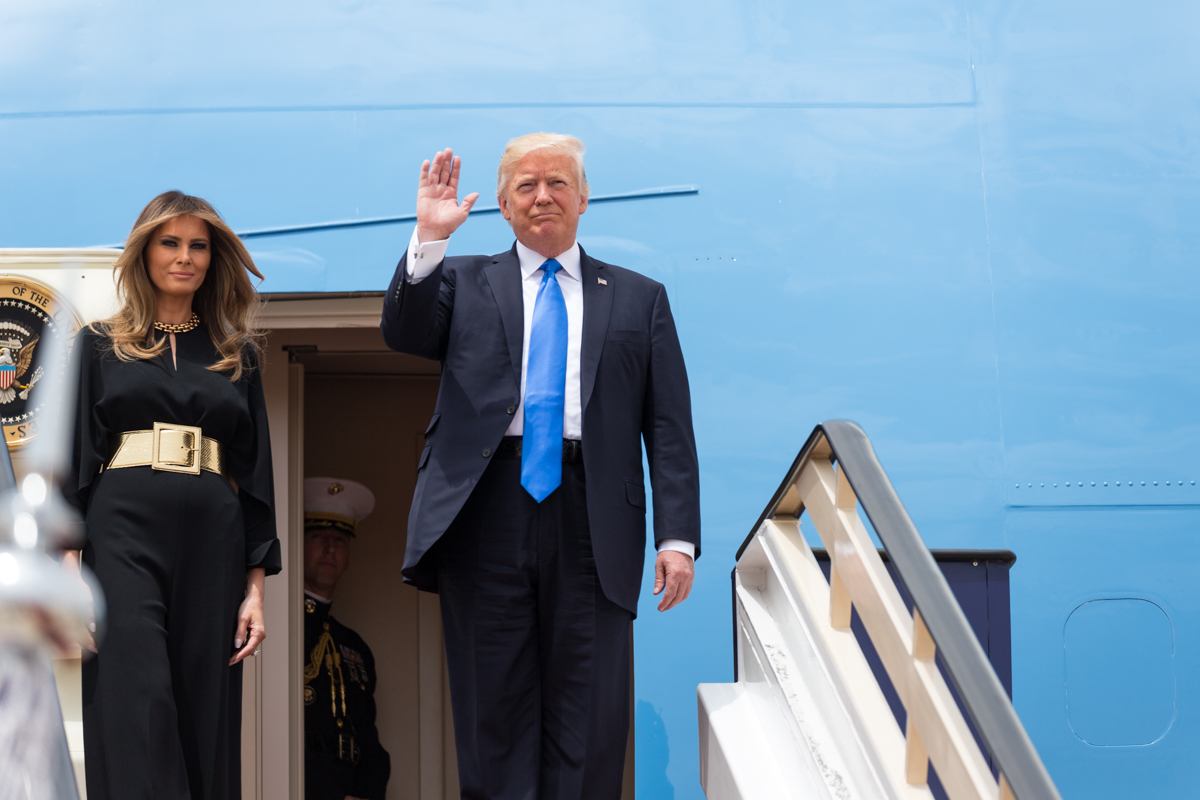by Brian Hioe
語言:
English
Photo Credit: Gage Skidmore/Flickr/CC
AFTER COMMENTS by outgoing president Donald Trump, who lost to Joe Biden in 2020 American presidential elections, a pro-Trump mob stormed the US Capitol earlier today. This took place after a speech given by Trump outside of the White House claiming that the election was stolen from him, calling on supporters to go to the Capitol. Some have dubbed the storming of the Capitol to be a historically unprecedented event.
The pro-Trump mob was seeking to stop the electoral vote count ongoing in the Senate, which would confirm Joe Biden as the winner of 2020 presidential elections. In breaking into the Senate chambers, the mob was successful in delaying the electoral vote count, though it is likely the vote will resume if they are cleared from the Capitol.
 The US Capitol Building. Photo credit: UpstateNYer/WikiCommons/CC
The US Capitol Building. Photo credit: UpstateNYer/WikiCommons/CC
After some contention about whether the National Guard would be deployed, it was eventually announced that they would be deployed to handle the situation. A woman was shot within the US Capitol and is reported to have died, improvised explosives were found in the building, and with the imposition of a curfew in Washington DC, it is probable there will be further violence. At press time, police are using tear gas to clear protesters around the Capitol, though police have been accused of lax action that led to protesters entering the Capitol, and seem to be mostly successful in pushing back protesters. Notably, an individual was spotted waving a ROC flag outside of the White House during the protests.
At the same time as the electoral vote count, the results of the Senate run-off in Georgia currently projects that this will result in a Democratic Party win, resulting in Democratic Party control of both the Senate and House of Representatives. Consequently, some have framed the occupation as an attempted coup by Trump supporters, in order to overturn election results unfavorable to them.
Indeed, during the electoral vote count, some Republican legislators challenged the validity of results in Arizona. Before the vote count, some called on vice president Mike Pence to refuse to recognize the results of the electoral college, claiming that the vice president has the authority to reject the electoral vote results, as did Trump himself. Pence eventually declined to do so, stating that he did not have the unilateral authority as vice president to overturn the election results. In a recorded phone call, Trump also sought to pressure Georgia’s secretary of state to overturn Georgia’s voting results in his favor.
There has been some fragmentation in the Republican Party between those who tried to overturn the election results, such as Ted Cruz, and those that called for accepting the election results. In an unprecedented event, all ten living Secretaries of Defense urged that Trump not declare the use of military force to try and overturn the election results. Either way, one expects Trump allies to encourage him to continue to incite his supporters, as well as further demonstrations to take place, and tweets by Trump after the occupation continued to insist that the election was stolen from him.
To that end, it is probable that one will soon see a wave of Trump supporters in Taiwan and Hong Kong claiming that the storming of the US Capitol is legitimate action aimed at preserving democracy. In Taiwan, one can expect comparisons to the March 2014 Sunflower Movement, seeing as it involved the month-long occupation of the Taiwanese legislature by student activists. In Hong Kong, one will see comparisons to the brief occupation of the Hong Kong Legislative Council (LegCo) in July 2019, something that participants compared at the time to the Sunflower Movement.
 American President Donald Trump (right) and First Lady Melania Trump (left) Photo credit: Shealah Craighead/White House/Public Domain
American President Donald Trump (right) and First Lady Melania Trump (left) Photo credit: Shealah Craighead/White House/Public Domain
It continues to be the case that many in Taiwan and Hong Kong continue to see Trump and the Republican Party through a rose-tinted lens. Because of his strong rhetoric against China and the passage of legislature seen as supportive of Taiwan or Hong Kong by the Republican Party under the Trump administration, such as the TAIPEI Act, Taiwan Travel Act, and Hong Kong Human Rights and Democracy Act, as well as actions such as the 2016 Trump-Tsai phone call or visits by high-ranking American politicians to Taiwan, many perceive Trump as staunch in his support for Taiwan and Hong Kong.
This has led not only to a refusal to accept Trump’s election defeat as legitimate, but to conspiratorial fear-mongering about the incoming Biden administration, ranging from accusations that Biden’s son, Hunter Biden, was secretly working with the Chinese government to ensure a Trump defeat, to belief in Pizzagate and QAnon-style conspiracy theories. Some Chinese dissidents in exile abroad have taken to believing such similar conspiracy theories, as amplified by outlets such as the Epoch Times, and other Falun Gong-affiliated media platforms. It is not surprising that the same Chinese dissidents have taken to celebrating the break-in to the US Capitol.
The embrace of Trump continues longstanding idealization of the US in Taiwan and Hong Kong, as well as the longstanding view that Republicans are more staunch in their opposition than Democrats. By contrast, due to the lingering memory of the Obama administration’s failure to check China’s growing power in the Asia Pacific and because of the actions of Democratic administrations during the Cold War, Democrats are perceived as conciliatory toward China. This is particularly the case with Taiwan, with current president Tsai Ing-wen having previously seen attempts to sabotage her campaign by America during the Obama administration, something that the DPP has never forgotten—never mind that overturning democratically elected governments has never been an obstacle to America under Democratic or Republican administrations alike.
It proves ironic, of course, that advocates of democracy in Taiwan and Hong Kong effectively call for the overturning of democracy in the United States because of their idealization of Trump. This is, of course, to turn a blind eye to the numerous occasions in which Trump has suggested that Taiwan and Hong Kong could be used as a geopolitical chess piece for American ends, for example, trading off Taiwan in return for a trade deal with China.
 Photo credit: White House/Public Domain
Photo credit: White House/Public Domain
It is also important to note that supposedly Republican allies of Taiwan and Hong Kong such as Ted Cruz shot down attempts to pass a refugee bill for Hongkongers fleeing to America, citing the possibility of Chinese spies mixing in with Hongkongers. This points to how Hongkongers and Taiwanese are, at the end of the day, still objects of suspicion for the United States, who are propped up when useful in order to criticize China, but only a shade away from being perceived as Chinese themselves. Such attitudes are more broadly true of supposed Republican allies of Taiwan and Hong Kong, inclusive of Trump.
More to the point, the hypocrisy should be self-apparent. For Taiwan, this is to ignore the history of stolen elections under the KMT and the long and brutal struggle for democracy that took place over decades, and for Hong Kong, this comes merely a day after mass arrests that effectively arrested all major pan-Democratic camp politicians.
However, insofar as such views of America are longstanding in Taiwan and Hong Kong, one does not expect this to change anytime soon. What comes next is hard to say, with Trump likely to use the attempted occupation to bolster legitimacy to his claims that he genuinely represents the will of the people and the election results were illegitimate, and supporters of Trump in Taiwan and Hong Kong likely to argue similarly.

